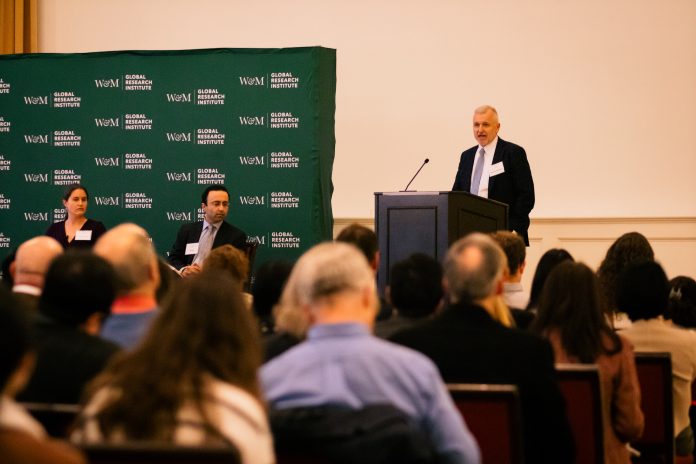
Thursday, Feb. 15, the Global Research Institute hosted a keynote discussion titled “How Should the United States Respond to China’s Rise?” in the Alan B. Miller Hall. The speakers, Columbia University’s James T. Shotwell Professor of International Relations Thomas J. Christensen, International Crisis Group Senior Researcher Ali Wyne and Editor-in-Chief of The Diplomat Shannon Tiezzi ’09, discussed China’s emergence and the United States’ response to the phenomenon.
“This panel is part of a broader conference on cooperation, competition and conflict in East Asia, which brings together more than three experts on security and Asia-Pacific in the Asia Pacific region to examine the history of international relations, the economic ties that bind the region states together and the risk of conflict over flashpoints such as the South China Sea, Taiwan and Korea,” George and Mary Hylton Professor of International Relations and Director of the Global Research Institute Michael Tierney ’87 said.
Tiezzi started the event by briefly describing the relationship between China and the United States.
“So today we’re talking about the U.S. [and] China. The relationship has been described as a systemic rivalry,” Tiezzi said. “There’s a mood in the U.S. where everything China does, whether there’s advances in technology, investments in overseas clean energy, prowess, its role in the UN and all of these things are seen as threats to the United States.”
Christensen, formerly the deputy assistant secretary of state for East Asian and Pacific affairs, explained he does not believe that China is an existential threat to the United States.
“China’s rise poses a series of security challenges for the United States. But I want to start by saying it’s not an existential threat to the United States, only Americans can destroy America,” Christensen said.
Christensen remarked that while globally the United States military is still ahead of China, the East Asian regional hegemon still poses a military threat to the United States. He also pointed to China’s disinformation campaign to assert its global diplomatic dominance.
“China tends to use those disinformation campaigns to do two things, to reduce criticism of Chinese Communist Party rule at home, and to reduce the chances that foreign states will support the other disputants to Chinese authorities, including across the Taiwan Strait and Taiwan. This is concerning enough, and it could change and become more concerning and really warrants our attention. Chinese partner Russia does attempt to undermine democracy in existing democracies and replace democracies with the authoritarian states abroad. China may start to do that as well, and we should keep an eye on that,” Christensen said.
Wyne also shared his characterization of China’s role in the world.
“[I’m] characterizing China a little bit differently than I think it’s often characterized in Washington. And I’m just to give you the bottom line up front, I’m going to try and convince you this evening that China is a constrained competitor indirectly, a direct competitor that is likely too — not for perpetuity — but certainly, for the long term. I think it’s a competitor in which the United States will have to contend, coexist and cohabitate,” Wyne said.
Wyne also said he does not believe that China is economically a juggernaut and thinks that China’s external environment is challenged militarily.
“So then the question is, how can the United States dissuade aggression against Taiwan? I don’t think the Chinese [are] a global hegemony. And I also don’t think it’s on the precipice of systemic decline. Again, as I said at the outset of my remarks, I think it’s a constrained competitor, but one that’s likely to endure,” Wyne said.
Wyne said the United States should focus on self-improvement.
“So I think [the] United [States] should focus more on this within its own race, becoming a better version of its best self,” Wyne said. “Certainly being vigilant about actions that China takes in undercut[ting] U.S. national interests, but not allowing China to dictate the terms of its foreign policy.”
Wyne expanded on what he thinks the United States should respond to China’s rise.
“And I think that the United States, again, thinks about swimming its own best phrase, doesn’t become overly fixated on time, and doesn’t allow China to dictate the terms of U.S. foreign policy, but instead thinks about articulating affirmative aspirations at home and abroad,” Wyne added.
The speakers also expanded on issues such as China’s threat to United States cybersecurity. Christensen said the United States should be working to protect itself from cyber attacks, as well as from China’s management of Hong Kong.
Attendee Patrick Hoover ’26 expressed appreciation for the speakers’ discussion, which he found to be easily digestible and covered a broad variety of issues. As a member of the GRI and the Institute for Integrative Conservation, he hopes that the GRI will host more events that are tied to environmental issues.
“Environmental science is very much tied to government, but also to other organizations and research, as well,” Hoover said.




























